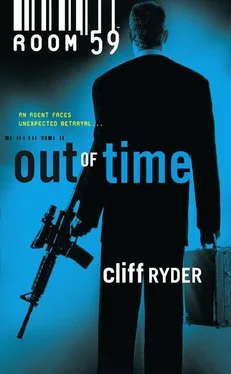“You will never escape,” a voice called to him.
“You might as well come out now and save us all a lot of trouble.” The voice was heavily accented with an Eastern European inflection. “You will not be hurt if you turn yourself in now.”
Another voice crackled over a radio and Alex picked up the message clearly.
“Explosive devices detected on levels five and three.”
“Find them,” the first voice snapped. There was a squawk of static.
Alex crawled into the oval wall spacer and glanced up and down the outer hallway. There was no light at all, except a small square down the hall and across several runs of cables. It had to be another way out. He slid onto the snaking lengths of cable and crawled across. Pulling himself along with his hands, his fingers screamed in pain.
Halfway across his left hand locked, but Alex ignored it, using it like a claw and pushing with his booted toes, while simultaneously trying not to make any sound. It was less critical beneath the hall, but as soon as they figured out how he’d disappeared in the computer room, and where he’d gone, they’d be on him.
After what seemed far too long, he reached the gray-lit area on the far side of the hall. It was another oval passage between walls, and Alex slid through without hesitation. He immediately felt an increase in temperature. His mind flipped through floor plans, and he realized he was directly above the furnace area. It had to be a maintenance room, possibly leading to laboratories with access to the main passages.
Lifting the first deck plate he came to, Alex peered around the room. He saw duct work immediately ahead. He pulled himself up and out, lowering the plate back into place as quietly as possible. The space he stood in was a small, shadowed area. The room beyond consisted of several racks of operator panels, a long workbench that held equipment open for repair and a door that led out. He tried to think, but he couldn’t seem to get his mind to focus. Between the pain in his body and the stress, it was as if someone had stirred his brains with a giant spoon. Sweat dripped into his eyes, and a sudden sharp stab of pain shot through his right thigh. He felt the trembling in his hand and willed it to stop.
“Not now,” he whispered. “God, not now.”
He heard footsteps again. In the distance he heard the amplified voice calling to him again.
“Give yourself up. You are surrounded, and there is no way out of this building.”
He had nothing to lose by responding at this point. It would be only moments before they located him. All he could hope to do was to lead them on a slightly longer chase and delay the discovery of the explosives.
“Maybe I’ll just kill you all and walk out,” he called.
As soon as he spoke, he moved. He knew it would be difficult to pinpoint where sound originated, but they were going to know the general area. He wanted to get out of the maintenance room if possible and into one of the labs again. If technicians were present, he might use that to his advantage. If he moved quickly enough he might be able to assume a new disguise. There were possibilities, but none of them existed unless he got moving.
As he stepped through the doorway, he heard a shout from his right. He’d been spotted. Ahead to his left was the entrance to one of the main laboratories. He caught sight of frightened faces within.
He lunged for the door, but this time the effort proved too much. His left leg suddenly gave out beneath him, and he tumbled to the side with a cry of pain. A shot rang out and something struck him hard in the shoulder, spinning him out of control.
Alex managed to get his Glock out of the holster. He turned and pulled the trigger. He heard cursing and shouts, but for some reason the words wouldn’t register. He crashed into the wall by the door frame of the lab and pain shot through his shoulder, already soaked in blood from the gunshot. He gritted his teeth and tried to stand, but his legs would not support him. He turned and raised his gun, watching for movement.
Two men appeared, crouching low and moving down opposite sides of the passageway toward him. He took aim at the man on the left and fired, saw the Glaser round strike him midchest and blow him off his feet, leaving a splatter of blood on the wall next to him.
Alex tried to roll to his right, but somewhere between his brain and his legs, the signal went haywire. What was supposed to be a smooth roll turned into a flop, and he landed heavily on the floor as another searing lance of pain brushed his temple. He’d felt the bullet before he heard, as if from far away, the report of the gun.
Then everything went black.
The more Brin thought about Alex shutting her out of his world, the more it hurt. She wondered where he was, what he was doing—and if he was okay.
She wondered if he’d found an alternate source of the medication he’d been prescribed, or if he’d just determined to “tough it out” and “work through the pain,” as she’d heard him boast on so many other occasions. This was not a sore muscle or a bad cold.
There was no way to “push through the pain” on this one. She needed to talk to him, to know how far it had progressed. The not knowing was the worst. That and the stupid, secret chat room where people knew things about her husband that she didn’t.
The only thing keeping her sane was her work.
What Rand had brought her was so miraculous that working with it took her away. She and Alex had always joked that when she was lost in an idea, the world didn’t exist at all. To a point it was true. She took her research very seriously. It was important to her to make progress, to help people. With Alex itching at her thoughts, though, she considered calling Rand and asking for some time off. If the new project hadn’t been on such a tight timeline, she probably would have—it wasn’t fair to be distracted when she was working on something so important.
When he was on an assignment, Alex was usually completely out of touch. It had always bothered her, but when he told her it was important to his work, she’d never complained. Now she saw it for what it really was—a lie. He didn’t tell her where he was because he had already built a lie that he couldn’t dig his way out of, telling her he worked for a security company. No normal security company would be totally unable to reach one of its employees under these circumstances.
She wondered if he had ever really been where he had told her he would be, or doing anything even remotely resembling what he told her he’d be doing. She wondered what else he’d lied about.
They had an emergency communication plan.
She’d only used it twice, and Alex had only responded one of those times. They’d set up anonymous e-mail accounts on a Web server. The accounts were not associated with them by name, address, phone number or any account they shared.
If they really needed to be in contact, they used the Web site to leave messages. Brin had logged into that site dozens of times in the past few hours.
Each time she’d left him a note. Each time she’d checked her own inbox and found it empty. It grew compulsive, over time. She couldn’t stop herself from opening the page, refreshing the inbox and sending messages.
Then it occurred to her that if the man in the Room 59 chat room had known what she was wearing, sitting in front of a computer in her own home, he would have a way to trace where she went on the Internet. She cursed and shut down the screen, aching to open it again. It was a portal to Alex, even if the other end of the portal appeared to be closed. If he showed up or contacted her, she wanted to know it the minute it happened. She felt helpless and it was terrible sensation.
To fill the hours when she should have been sleeping, once Savannah had been put down for the night, she turned to research. She had been to every major Web site on MS, and combed them all for useful information. She’d familiarized herself with symptoms, medications, treatments, and when those sources had been depleted, she’d moved on to the cellular level, her mind racing as she perused current research and development on cures, radical treatments, unapproved processes and theories on combating the disease. While MRIS hadn’t spent a significant amount of time on this particular disease, there were applications within their research that might be relevant to MS.
Читать дальше
Конец ознакомительного отрывка
Купить книгу










